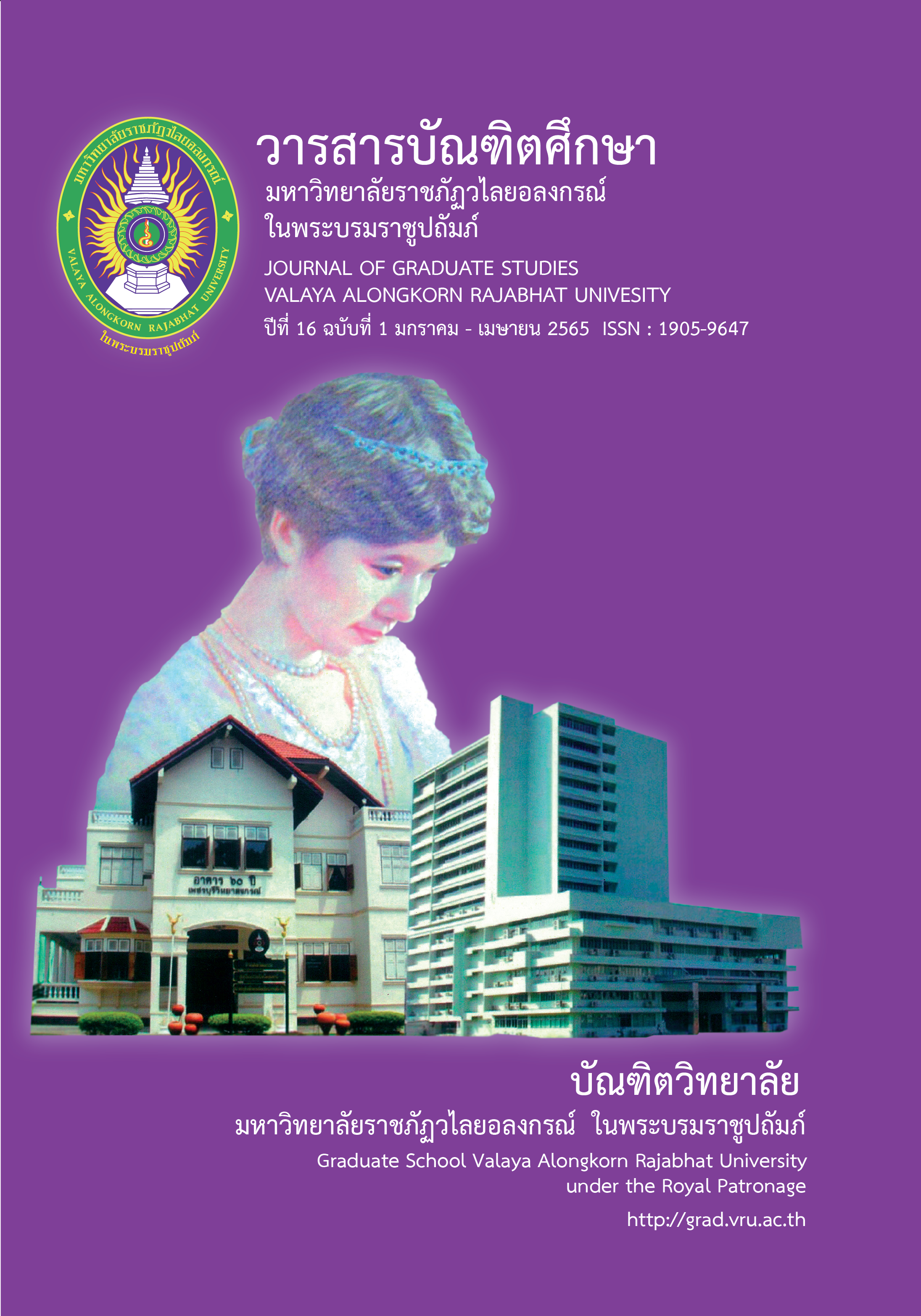FACTORS AFFECTING THE PERCEPTION OF SUFFICIENCY ECONOMY PHILOSOPHY PRINCIPLES OF UNDERGRADUATE STUDENTS, FACULTY OF EDUCATION IN VALAYA ALONGKRON RAJABHAT UNIVERSITY UNDER THE ROYAL PATRONAGE
Main Article Content
Abstract
The objectives of this research were to 1) study the level of the perception of Sufficiency Economy Philosophy principles and 2) the factors affected towards the perception of Sufficiency Economy Philosophy principles of students in the Faculty of Education in Valaya Alongkron Rajabhat University under the Royal Patronage. The research sample consisted of 329 elementary students in the Faculty of Education Undergraduate in Valaya Alongkorn Rajabhat University and student were studied in the first semester of the 2563 academic year. Data were collected by a questionnaire which Cronbach’s Alpha Coefficient (α) = 0.921 and analyzed by means, average deviation, correlation coefficient, multiple linear regression analysis (stepwise).
Research findings were as follows: 1) The perception of Sufficiency Economy Philosophy principles of students in the Faculty of Education Undergraduate in Valaya Alongkorn Rajabhat University were high in all aspects. 2) The relations between 4 factors affected towards the perception of Sufficiency Economy Philosophy principles were positive direction with significant at the .05 level : the factor with the most perception of Sufficiency Economy Philosophy principles was the factor of Prototype and role model with Correlation Coefficient at the 0.268 level the factors of family support, the factors of teacher- student interaction and instructional climate with Correlation Coefficient at the 0.221, 0.168, and 0.155 level as follows. Factors affected towards the perception of Sufficiency Economy Philosophy principles have the factors to predict the perception of Sufficiency Economy Philosophy principles of students in the Faculty of Education in Valaya Alongkron Rajabhat University Under the Royal Patronage was Prototype and role model , family support, teacher- student interaction and instructional climate the factors were able to make a prediction of 63.8 % and regression equation of standard scores is the perception of Sufficiency Economy Philosophy principles = 0.350 (Prototype and role model factor)+ 0.302(family support factor)+ 0.229 (teacher- student interaction factor) +0.198(instructional climate).
Article Details

This work is licensed under a Creative Commons Attribution-NonCommercial-NoDerivatives 4.0 International License.
บทความทุกเรื่องได้รับการตรวจความถูกต้องทางวิชาการโดยผู้ทรงคุณวุฒิ ทรรศนะและข้อคิดเห็นในบทความ Journal of Global of Perspectives in Humanities and Social Sciences (J-GPHSS) มิใช่เป็นทรรศนะและความคิดของผู้จัดทำจึงมิใช่ความรับผิดชอบของบัณฑิตวิทยาลัย มหาวิทยาลัยราชภัฏวไลยอลงกรณ์ ในพระบรมราชูปถัมภ์ กองบรรณาธิการไม่สงวนสิทธิ์การคัดลอก แต่ให้อ้างอิงแหล่งที่มา
References
Bandura, A. (1977). Social Learning, theory. New Jersey: Pretice. Hall.
Bandura, A. (1986). Social foundations of though and action: a social cognitive theory. Englewood Cliffs, New Jersey: Prentice-Hall.
Bhiromrat, K. (2010). patčhai thī samphan kap phrưttikam kāndamnœ̄n chīwit tām pratyā sētthakit phō̜phīang khō̜ng naksưksā mahāwitthayālai rātchaphat Phra Nakhō̜n Sī ʻAyutthayā [Students conduct of Rajabhat Unversities in Bangkok on the way of self-sufficient economy]. Bangkok: Suan Sunandha Rajabhat University.
Best, J. W. (1981). Research in Education. New Jersey: Premtice-Hall.
Hurlock, E. B. (1974). Development Psychology. New Delgi: Tata Megraw-Hill.
Office of the Education Council. (2010). phǣnkān sưksā hǣ chāt chabap prapprung (Phō̜.Sō̜. sō̜ngphanhārō̜ihāsipsō̜ng - sō̜ngphanhārō̜ihāsipkāo) : chabap sarup. Bangkok: Phrik Wan Graphic.
Ryans, David G. (1960). Characteristics of teachers: Their description, comparison, and appraisal, a research study. Washington, D.C.: American Council on Education.
Schumacher, R. E. & Lomax, R. G. (1996). A beginner’s guide to structural equation
modeling. New Jersey: Lawrence Erlbaum Associates, Publishers.
Tekhanmag, K. (2013). phrưttikam kāndamnœ̄n chīwit tām lak pratyā sētthakit phō̜phīang khō̜ng naksưksā mahāwitthayālai rātchaphat nai khēt Krung Thēp Mahā Nakhō̜n [Factors Related to Life Styles by Sufficiency Economy Philosophy of Students of Phranakhon Si Ayutthaya Rajabhat University].Phra Nakhon Si Ayutthaya: Phranakhon Si Ayutthaya Rajabhat University.
Yamane, T. (1973). Statistics: An Introductory Analysis. Third edition. NewYork: Harper and Row Publication.


